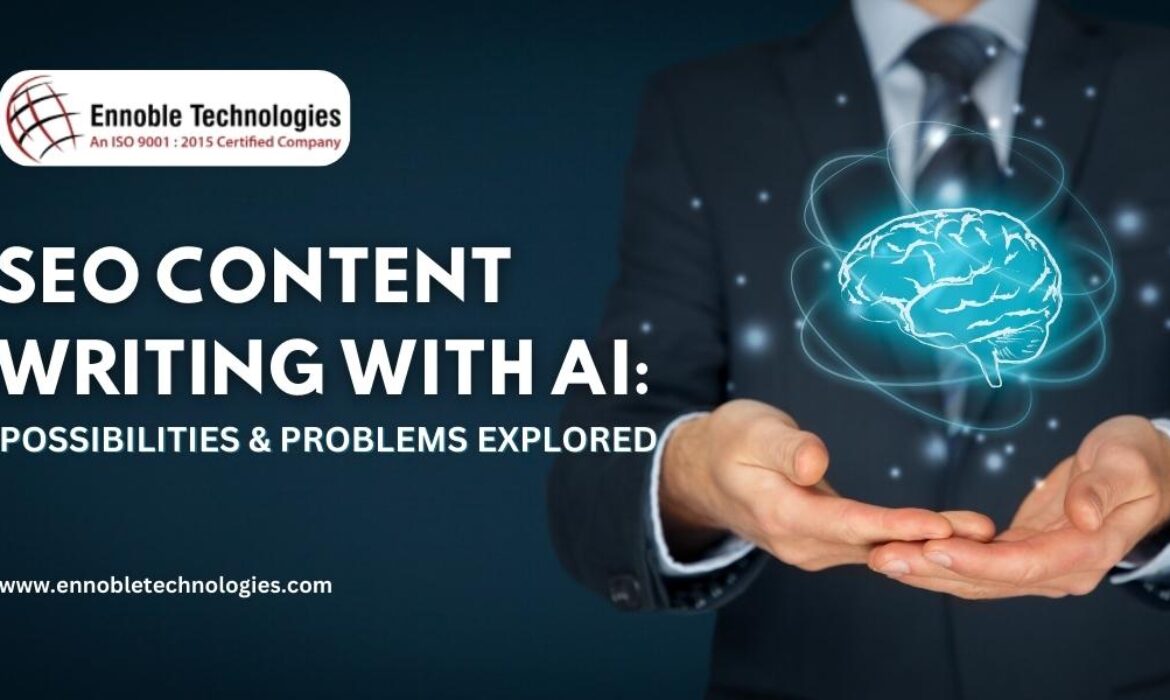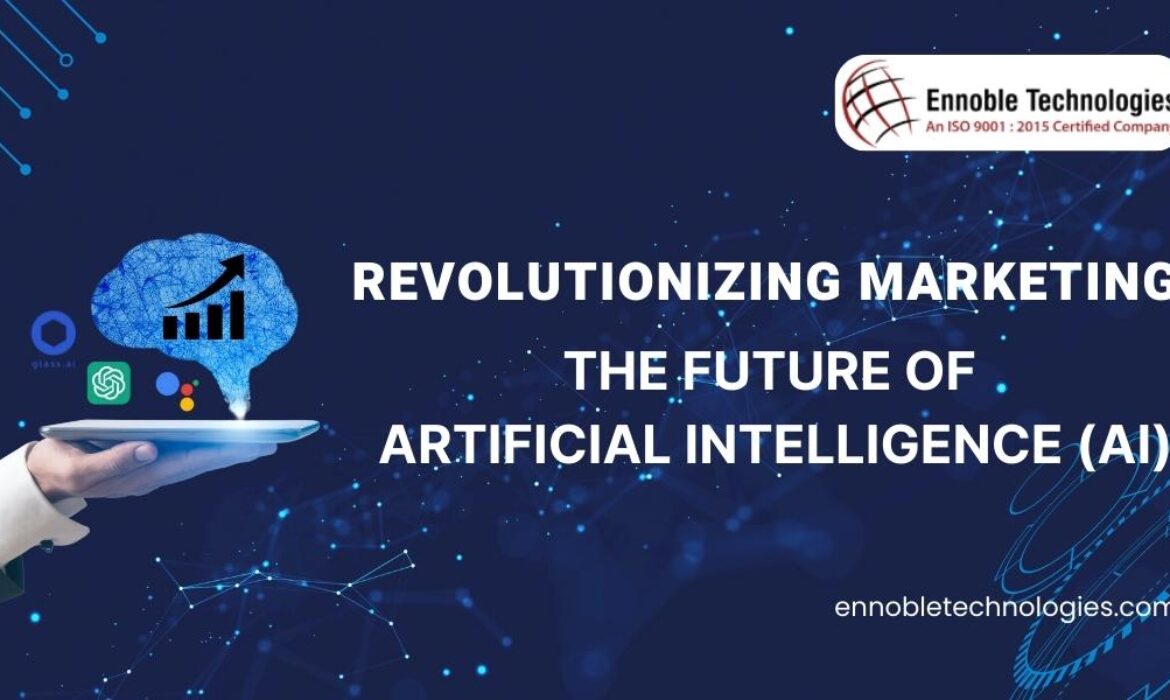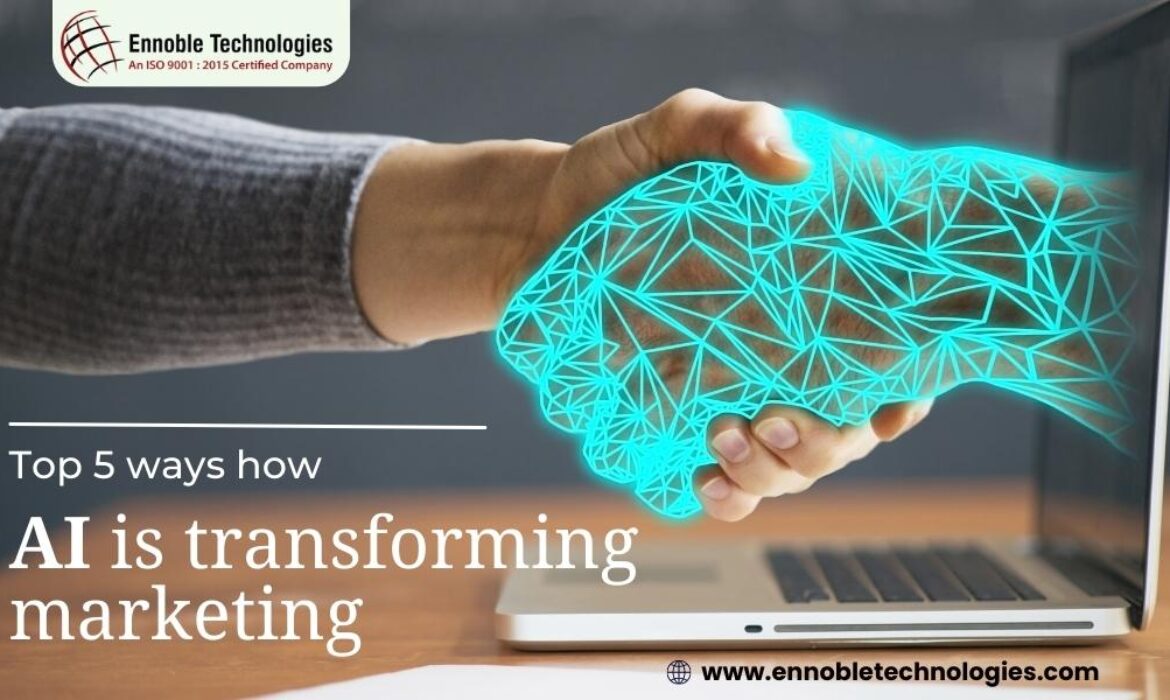SEO Content Writing with AI: Possibilities & Problems Explored
Hello there! In the dynamic world of digital marketing, staying ahead of the competition requires a well-executed SEO strategy. As technology continues to advance, AI-powered content writing tools have emerged as a promising solution for optimizing website content to rank higher in search engine results. These tools harness the power of artificial intelligence to generate SEO-friendly content, promising improved visibility and organic traffic. But like any innovation, AI-powered SEO content writing comes with its own set of possibilities and challenges. In this blog post, we’ll take a friendly dive into the world of AI and explore the potential benefits and complexities of using AI for SEO content creation.
The Possibilities of AI in SEO Content Writing:

1. Enhanced Efficiency:
AI-powered content writing tools can automate various aspects of the content creation process, saving time and effort for marketers and content creators. These tools can generate high-quality content at a faster pace, enabling businesses to scale their content production and meet the demands of an ever-growing digital landscape.
2. Improved Keyword Optimization:
AI algorithms can analyze vast amounts of data and identify patterns in keyword usage. This allows AI-powered content writing tools to suggest relevant keywords and optimize content accordingly. By incorporating these suggestions, businesses can improve their keyword targeting and increase their chances of ranking higher in search engine results.
3. Content Personalization:
AI can analyze user behavior, preferences, and demographic information to create personalized content. By tailoring content to individual users or specific target audiences, businesses can enhance user engagement, increase conversion rates, and build stronger connections with their audience.
4. Language and Grammar Enhancement:
AI-powered content writing tools often come equipped with advanced language processing capabilities. They can identify grammatical errors, suggest improvements, and even generate content that adheres to a specific tone or style. This helps ensure that the content produced is not only optimized for search engines but also of high quality and readability.
The Problems and Challenges of AI in SEO Content Writing:

1. Lack of Contextual Understanding:
AI algorithms may struggle to comprehend the nuances of language, cultural references, or context-specific content requirements. This can result in content that feels robotic or lacks the human touch, potentially impacting user engagement and brand credibility.
2. Originality and Uniqueness:
AI-powered content writing tools can generate text based on existing data and patterns. While this can be efficient, it raises concerns regarding the originality and uniqueness of the content. Plagiarism and duplicate content issues can harm search rankings and damage a brand’s reputation.
3. Ethical Considerations:
The use of AI in content writing raises ethical concerns, such as the potential for biased or misleading content. AI algorithms are trained on existing data, which may contain biases or inaccuracies. It is essential for businesses to maintain ethical practices, review AI-generated content, and ensure compliance with legal and ethical standards.
4. Human Touch and Creativity:
AI may struggle to replicate the creativity, intuition, and emotional connection that human content creators bring to their work. Content that lacks the human touch may fail to resonate with audiences on a deeper level, impacting the overall user experience and brand perception.
Conclusion:
As the digital landscape continues to evolve, AI-powered content writing tools hold immense promise for optimizing SEO strategies and streamlining content creation processes. The possibilities are vast, including enhanced efficiency, improved keyword optimization, personalized experiences, and polished language quality. However, it’s important to navigate the challenges that come with AI, such as the need for contextual understanding, maintaining originality, addressing ethical considerations, and preserving the human element in content creation.
To harness the full potential of AI in SEO content writing, striking a balance between automation and human creativity is crucial. By utilizing AI as a valuable tool and infusing it with the unique insights and touch of human content creators, you can create compelling, engaging, and authentic content that resonates with your audience.
Remember, technology is a powerful ally, but it should never overshadow the importance of human connection and creativity. Embrace the possibilities that AI offers while remaining mindful of its limitations, and you’ll be well-equipped to navigate the ever-evolving landscape of SEO content writing with confidence and success.
Read More: Revolutionizing Marketing: The Future of Artificial Intelligence (AI) – Ennoble Technologies
Revolutionizing Marketing: The Future of Artificial Intelligence (AI)
With the rise of digital marketing, businesses are always on the lookout for a competitive edge. In recent years, Artificial Intelligence (AI) has emerged as a game-changing technology that is revolutionizing the world of marketing. AI can analyze customer data in real-time and provide insights into consumer behavior, preferences, and patterns. It can even assist in the creation and optimization of personalized marketing campaigns.
As AI continues to evolve and advance, it is predicted to become an integral part of the marketing landscape. Marketing professionals who embrace this technology early on will have a significant advantage over their competitors. In this blog, we will explore the future of AI in marketing and its potential impact on the industry.
Understanding Artificial Intelligence (AI)
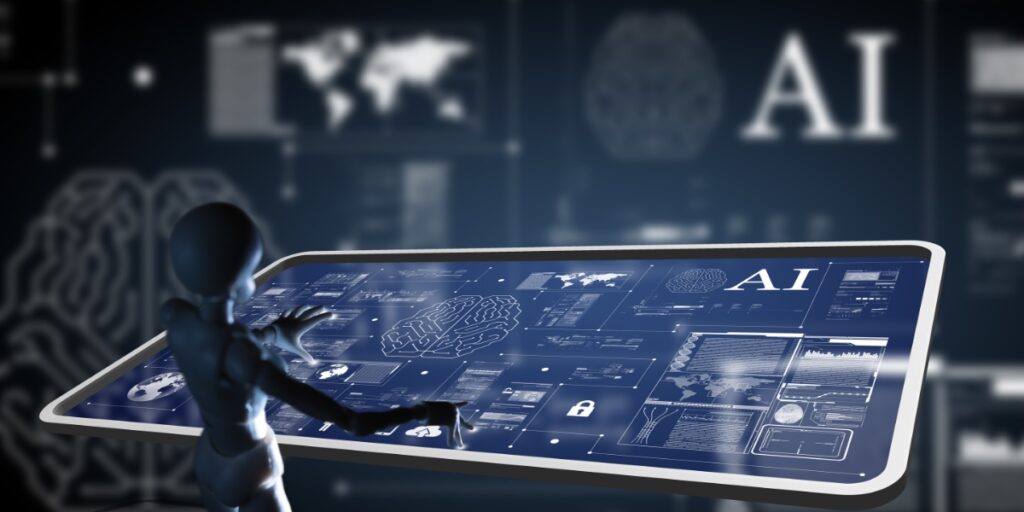
Artificial Intelligence (AI) is a term used to describe the ability of machines or algorithms to carry out tasks that typically require human intelligence. This involves the ability to learn, reason, and solve problems. AI systems use a variety of techniques including machine learning, deep learning, and natural language processing to understand and interpret data.
At its core, AI relies on vast amounts of data to generate insights and make predictions. This data can come from a variety of sources such as customer interactions, social media activity, website traffic, and more. AI systems then use this data to learn and improve over time, becoming more accurate and effective at predicting customer behavior and preferences.
One of the most significant advantages of AI is its ability to process and analyze vast amounts of data in real-time. This means that businesses can use AI to create personalized marketing campaigns that are tailored to individual customers, providing a more engaging and personalized experience. Additionally, AI can help marketers to identify new opportunities and target new audiences, enabling them to stay ahead of the competition.
As AI continues to evolve and become more sophisticated, we can expect to see even more exciting applications in marketing. For example, AI could be used to create chatbots that can provide instant customer support, or to identify potential new markets for businesses to explore. Ultimately, the future of AI in marketing looks bright, and businesses that embrace this technology will be well-positioned to thrive in the years ahead.
The union of Artificial Intelligence and Marketing

The integration of Artificial Intelligence (AI) and marketing is no longer a distant future, but a reality that is already transforming the industry. The union of AI and marketing promises to revolutionize the way businesses communicate with their customers and improve the overall customer experience. Here are some of the ways in which AI is changing the face of marketing:
- Predictive Analytics – AI systems enable businesses to analyze large amounts of data about customer behavior and preferences, allowing them to predict future trends and identify potential new markets. This information can then be used to tailor marketing campaigns that are highly relevant to individual customers.
- Personalization – AI allows marketers to create more personalized experiences for customers by analyzing data about their browsing and purchasing behavior. This data can be used to create tailored content and messaging that speaks directly to the individual customer.
- Chatbots – AI-powered chatbots can provide instant customer support, answering questions and providing solutions to common problems around the clock. This not only improves the customer experience but also frees up resources that can be used elsewhere in the business.
- Content Creation – AI algorithms can be used to create highly engaging content, from blog articles to social media posts. This allows businesses to produce a large volume of quality content efficiently and cost-effectively
- Marketing Automation – AI-powered marketing automation tools can streamline many marketing processes, improving efficiency, and reducing costs. For example, AI can be used to automate email campaigns, social media posts, and even advertising campaigns.
As AI technology continues to evolve, we can expect to see even more exciting applications in marketing. Ultimately, the union of AI and marketing promises to create a more personalized and seamless customer experience that will benefit both businesses and their customers. Businesses that invest in AI-powered marketing tools will be well-positioned to stay ahead of the competition and thrive in the years ahead.
Benefits of using Artificial Intelligence in marketing

Artificial Intelligence (AI) is revolutionizing marketing and opening doors to new opportunities. Here are four benefits of using AI in marketing:
- Increased Efficiency – AI-powered marketing tools can automate repetitive tasks, freeing up time for marketers to focus on creativity and strategy. This can lead to increased efficiency, improved productivity, and cost savings.
- Data-Driven Decision Making – AI can analyze customer data to provide valuable insights into behaviors, preferences, and trends. This information can inform marketing strategies and campaigns, leading to more targeted and effective communication.
- Improved Customer Experience – By utilizing AI-powered chatbots and personalization, businesses can provide a more seamless and personalized customer experience. This can lead to increased customer satisfaction, loyalty, and retention.
- Competitive Advantage – Businesses that embrace AI in marketing will have a competitive advantage over those that do not. By staying ahead of the curve and utilizing the latest technology, businesses can stand out in a crowded market and attract more customers.
Overall, AI has the potential to revolutionize marketing and provide businesses with a valuable edge. As the technology continues to evolve, we can expect to see even more exciting applications in the marketing realm. By utilizing AI-powered tools and strategies, businesses can stay relevant and competitive in the years ahead.
Current use cases for AI in marketing

AI is being used in a variety of ways within the marketing sector, with innovative companies exploring the technology to gain a competitive edge. Here are five examples of current use cases for AI in marketing:
- Personalized Marketing – AI allows businesses to tailor their marketing efforts to individual customers. By analyzing customer data, marketers can create personalized promotions and product recommendations, leading to higher engagement and conversion rates.
- Predictive Analytics – AI can forecast future trends by analyzing past data. By understanding customer behavior patterns, marketers can predict which products and promotions will be successful and plan accordingly.
- Chatbots – AI-powered chatbots offer a 24/7 customer service experience. They can quickly and efficiently answer customer inquiries, qualify leads and even provide personalized product recommendations.
- Content Creation – AI can assist in content creation by generating headlines, captions, and even articles. This can increase productivity and streamline the content creation process.
- Programmatic Advertising – AI-powered programmatic advertising can automatically adjust campaigns based on performance, ensuring ads are shown to the right people at the right time on the most effective channels.
These use cases are just a few examples of how AI is revolutionizing marketing. As technology continues to evolve, we can expect to see even more innovative applications of AI in the marketing industry. Embracing AI can help businesses gain a competitive advantage and improve their marketing strategies in the years ahead.
The future of AI in marketing

The rapid growth of artificial intelligence (AI) technology is transforming the marketing industry. AI has the potential to revolutionize marketing by providing innovative solutions to businesses for better engagement with their customers. Here are six predictions for the future of AI in marketing:
- Even More Personalization – With the increasing amount of data available, AI will enhance personalization to the level where ads and product recommendations will be tailored specifically to each individual customer.
- AI-powered Virtual Assistants – AI-powered virtual assistants can help companies with customer service by providing immediate solutions to customer issues, as well as assistance in purchasing decisions.
- Voice Search Optimization – AI-driven voice search is the future of search. With voice search optimization, brands can develop voice-activated content, which will help them reach their customers in new ways.
- Image Recognition for Advertising – AI-powered image recognition technology will help businesses automatically categorize images based on products, locations, and patterns. This will also enable them to display targeted ads to customers.
- Better Data Analysis – AI can analyze vast amounts of data much more efficiently than humans. In the future, AI will be more successful in finding meaningful and impactful correlations and trends.
- Increased Automation – AI-driven automation will help businesses automate many time-consuming marketing tasks such as social media posting, email marketing, and lead scoring. This will allow marketers to focus on other significant tasks, including customer engagement.
As AI technology continues to evolve, businesses can expect to see significant advancements in marketing techniques and strategies. With its powerful analytical abilities, AI has the potential to transform the way marketing campaigns are planned and executed in the future.
Potential implications and ethical considerations
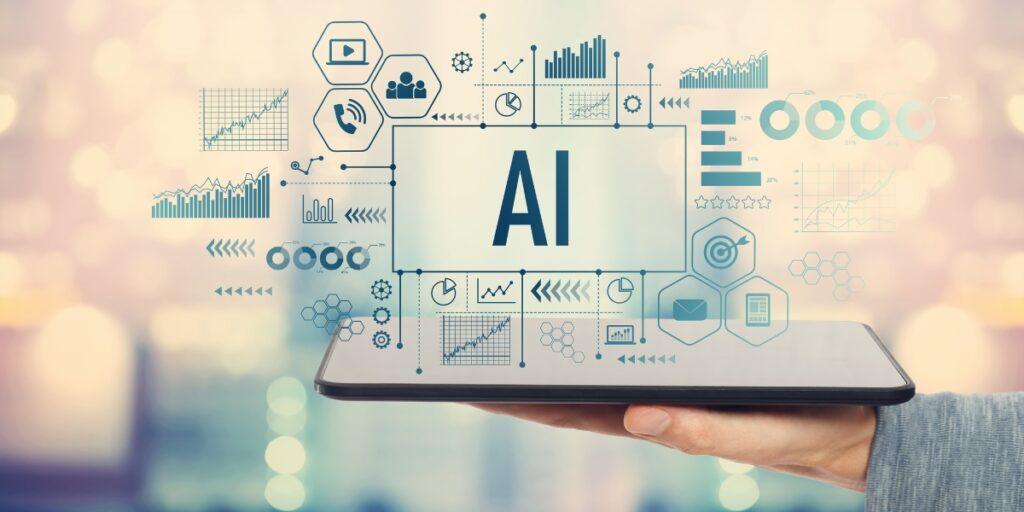
As with any emerging technology, artificial intelligence (AI) in marketing comes with potential implications and ethical considerations. Here are seven implications and considerations to be aware of:
- Bias – AI algorithms can perpetuate bias based on data used to train them. Marketers need to ensure any data they use is not biased or incomplete, and ensure AI is programmed with ethical guidelines.
- Privacy – As AI collects more data, potential privacy concerns continue to arise. Marketers must be transparent about data collection practices and ensure consumers can opt-out.
- Job Loss – Automation with AI could lead to job loss. Organizations must consider the impact on their staff and collaborate with them to find new roles.
- Data Security – As organizations collect more data, they must ensure they are secure from cyber-attacks. Hackers could use the data to create fake personas and purchase goods and services on behalf of unsuspecting people.
- Accountability – As AI takes over decision-making processes, accountability needs to be defined. Who will take responsibility for decisions made by AI algorithms?
- Over-reliance – AI in marketing could lead to over-reliance on algorithms and automation. Marketers still need to think critically and creatively to create effective campaigns.
- Customer Trust – As AI technology becomes more integrated into the marketing industry, organizations must gain customer trust by being transparent about their data practices and by being mindful of privacy concerns.
As AI continues to change the face of marketing, organizations must be aware of the potential implications and ethical considerations to ensure they make the most of this powerful technology while also remaining responsible and ethical.
Conclusion
In conclusion, the future of artificial intelligence in marketing is promising. As AI technology continues to revolutionize the industry, marketing professionals must be aware of the numerous implications and ethical considerations that come with it. Ensuring that AI is unbiased, privacy is protected, job loss is minimized, data security is maintained, accountability is defined, critical thinking is still present, customer trust is gained, and ethics are maintained is imperative. By doing so, companies can take advantage of the power of AI while ensuring that they remain responsible and ethical in their marketing practices. As the world becomes increasingly digitized, AI is sure to play an even more significant role in the way marketing is conducted. By embracing this powerful tool while remaining mindful of ethical considerations, organizations have the potential to dominate the marketing landscape far into the future.
Stay tuned to our space for more interesting topics of discussion.
Also Read: Mobile Friendliness – Your Key to Connecting with Users on the Go | Ennoble Technologies
Top 5 Ways How AI is Transforming Marketing
With technological advancements in the modern world, Artificial Intelligence (AI) plays a major role in almost every sector. You can experience its contribution in all the sectors of your everyday life, be it the health sector, everyday shopping, and much more!
With AI, solving problems will be faster and more efficient. AI can analyze and collect data by prioritizing and identifying potential audiences.
It has a deep-rooted impact in all the spheres around you, including the direction of marketing too! Are you interested in learning how this technology brings a wave of transformation in marketing? Read this blog to find out how AI is changing the world of marketing and opportunities.
Top Ways in which AI Transforms the Marketing Structure
Without a second thought, AI has taken over marketing patterns. AI is sure to bring significant changes to the marketing industry, but it has its merits and limitations too!
Check out the top 5 ways in which the game of AI is changing the prospects of marketing, particularly digital marketing in the present context!
· Understanding Consumer Behavior: Assessing consumer behavior and patterns is of utmost importance for marketers. And AI does this job perfectly for you! By using AI, you can now gather valuable information about your consumers, including their preferences, tastes, and demands.
AI can trace down what your consumers buy, search, or view over the internet. This technology will provide you with a huge dataset so you can analyze what your potential customers really want!
As a marketer, you can understand what your consumers are looking for accurately and efficiently! You can use a variety of AI tools to track your customers’ behavior and collect real-time data about their experiences!
· Curated Content: Apart from understanding your customers’ behavior, AI will help you curate personalized experiences for them too! Along with understanding their consumption patterns and choices, offering customers personalized recommendations is no longer a challenge!
Don’t you love getting updated about the latest deals and discounts through email from your favorite brands? Your emails, ads, and pop-ups are based on the preferences you have expressed on online platforms. Those catchy pop-ups and notifications that always grab your attention are the perfect example of curated content creation with the help of AI.
• Predicting The Future Trends: You must be able to predict upcoming trends and patterns when developing different products and services. But what are the chances that future trends can be forecasted? With AI, it’s now possible!
AI marketing is known to identify emerging trends and popular culture. By doing so, we will be able to develop products that will meet the trends. This activity is carried out by studying behavior patterns, preferences, and social media platforms. AI will present predictions for future campaigns and product development in the table!
· Better Marketing Structure: While scrolling through your accounts on different digital platforms or reading an informative piece on a website, you may have seen different ads. These ads are mostly based on your preferences and what you browse on the internet!
In this type of marketing, the brands are not convincing you to buy any particular product. Rather, half of their game is won if you click on that ad and visit their site! This is PPC or Pay-Per-Click advertising, and you can see them almost on every other site now, particularly while using Google!
As Google Ads are the most common example of this kind of advertising, you will find them on every top result for your searches. The chances of click rates and reaching out to more potential customers.
· Betterment Of Customer Experience: How do you feel about a website when you want to clear your queries or sign a complaint, but there’s no option to take care of your feedback? The highest chance, in this case, is that you will never visit the website or buy the product again!
It is crucial to listen to customers’ feedback and communicate with them quickly so as to satisfy them and enhance their experience with the brand. The option of chatbots is the most common way for websites to focus on communication with their customers.
AI’s capabilities are limitless, enabling chatbots to collect data and consumer feedback to generate reports on the same!
Conclusion
Regardless of the business type, AI can work wonders for your business! Artificial intelligence can be the best tool for your business, whether it’s to improve customer satisfaction or curate content after collecting and analysing data. Try out AI tools to boost your business today!
Want to know more about the recommended digital marketing strategies for small businesses? Read it here: https://bit.ly/3DNcDIs

